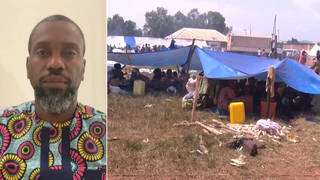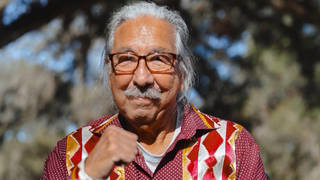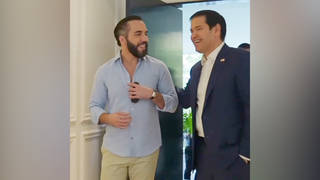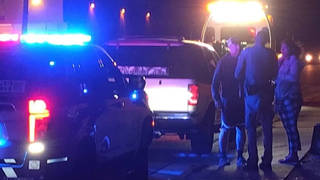
Related
Topics
Guests
- Carlos Eugenio Vargaslawyer for Coopetrabasur and board member of Agrofair.
- Yocser Carranza Godoybanana farmer from Costa Rica. He is president of the worker-controlled cooperative called Coopetrabasur.
Yocser Carranza Godoy, president of the worker-controlled cooperative called Coopetrabasur and the cooperative’s attorney Carlos Eugenio Vargas join us in New York to discuss the banana cooperative. [includes rush transcript]
Transcript
AMY GOODMAN: We turn from the issue of immigration to the issue of fair trade and to bananas. Bananas are the most popular fruit in the United States. You may have had one for breakfast today. Well, how did that banana get from the farmer in South America to your kitchen table?
The legacy of American banana corporations is a dark one. Earlier this year, Chiquita admitted to paying $1.7 million to a right-wing Colombian paramilitary group that’s considered a terrorist organization by the U.S. government. Chiquita is one of five major multinationals that dominate the U.S. banana industry, controlling over 95 percent of the business.
However, there’s an alternative to these corporate-controlled bananas that are growing in both producing and consuming countries. In Costa Rica, Chiquita used to rule the banana trade until it pulled out in 1980, following a devastating hurricane. Some of its ex-workers joined together to form a cooperative. Together, they purchased the Chiquita plantation. Now, each of its 70 members own a piece of the land. As a fair trade banana producer, the cooperative has developed measures to protect the environment, expand business, improve the quality of life for its members.
We’re joined right now by Yocser [Carranza Godoy]. He is a banana farmer from Costa Rica, is president of the worker-controlled cooperative. Carlos Eugenio Vargas is a lawyer for the cooperative and a board member of Agrofair. They both join us in our studio. We welcome you both to Democracy Now!
Let us begin with you, Carlos. Explain the significance of what’s happened in Costa Rica.
CARLOS EUGENIO VARGAS: Well, you already started talking that — we started 28 years ago, when Chiquita left the lands, so the government, well, had in their hands a big trouble, because those farms were the only source of employ for the people there. So we faced something like a very small agro reform in the town. So that’s how we start. Ten years ago, we started with the fair trade, and that means a very important difference for our cooperative.
AMY GOODMAN: What’s the name of the cooperative?
CARLOS EUGENIO VARGAS: Coopetrabasur. Now, actually, we are two cooperatives in this town. We formed another cooperative. We now are working together, and we are proud to say that we have 200 — more than 200 owners of the system. And, well, we are alive, because since 1997 we started working with fair trade, when in the region there was 15 banana farms. Now there’s only one remaining there, and not only in the south of Costa Rica, as well in the north of Panama, because the big companies has left this area, and, you know, the consequences that this means.
AMY GOODMAN: Can you talk, Yocser, about your cooperative and how you sell your bananas? Yocser is being translated by Jennifer Godoy, whose family actually worked on a farm, a banana farm in Ecuador, and she grew up here, though, in the United States, in New Jersey. Yocser?
YOCSER CARRANZA GODOY: [translated] My cooperative, Coopetrabasur, has been able to sell their bananas behind the fair trade system. When we began to be a part of the fair trade system, we’ve been able to have access to markets. So me and my family [inaudible] are getting the benefits of having that access to markets, which was facilitated through fair trade.
AMY GOODMAN: So how does it work? How do the bananas come to the United States? How do people find fair trade bananas?
YOCSER CARRANZA GODOY: [translated] Right now, currently, the way that we’re trying to get our bananas to the U.S. is through the company called OK USA, of which they’re also co-owners of. That’s the ownership [inaudible] of the company, so right now they’re not bringing their bananas into the U.S., and only going to Europe through Agrofair. But the company that OK USA is a part of, which is Agrofair, is how they would bring the bananas to market in the U.S.
AMY GOODMAN: And if people wanted to get those bananas, where do they call? How do they find out about them? And how many fair trade bananas are there? Let me ask that to Carlos.
CARLOS EUGENIO VARGAS: Well, that’s why we are here, and that’s why we thank you to give us the opportunity to tell to the people that they have to go to the supermarkets and ask for the fair trade bananas. Fair trade in Europe has been successful. You can see fair trade bananas in major chains in U.K., in Switzerland. So we say, why not in the United States? Maybe —- well, maybe we can link the last information with this information. What we want to do with the fair trade is to keep alive and safe our people in our communities. We don’t want to break our families. So we will ask the people that are seeing your program to go to their supermarkets and ask for the fair trade bananas. So in that way, they will allow us to bring our products here. So the consumer has their voice, their vote, and they can vote for the fair trade bananas. And what we want to do is give more cooperatives, more people on board of this system and benefit, expand -—
AMY GOODMAN: Tell us about Agrofair.
CARLOS EUGENIO VARGAS: Agrofair is a very interesting organization. You know, I’m a producer, and I belong to a producer organization. But Agrofair is co-owned organization — it’s an organization co-owned by the producers. So I can be sitting here talking in the name of Agrofair, because we produce. Agrofair is a Dutch company, settled by some NGOs. They have the 50 percent of the shares in this moment, and the other 50 percent belongs to all the producers in the South, in Latin America, Caribbean and Africa. So Agrofair is a very interesting model that redistributes in the chain not only money, because we receive a fair deal with them, but as well they redistribute power in the chain. And we say that we receive from Agrofair the fair say, the fair share, through the fair price.
AMY GOODMAN: If people want to get bananas from Coopetrabasur, which stands for cooperative of the workers of the south, what do they tell their supermarkets?
CARLOS EUGENIO VARGAS: Well, you know, in U.K., one of the biggest supermarkets recently changed, because the consumer pressure to —
AMY GOODMAN: This is in Britain.
CARLOS EUGENIO VARGAS: Yeah, this in Britain. Sainsbury is a supermarket. They changed because of pressure of the consumers. So the people in their houses in this moment that is eating a banana, their choice count, and they have a vote in their hand.
AMY GOODMAN: Do you have a website?
CARLOS EUGENIO VARGAS: Yeah, if you want to visit Agrofair, www.agrofair.com.
AMY GOODMAN: That’s www.agrofair.com.
CARLOS EUGENIO VARGAS: Agrofair. There’s a cooperative of producers of Agrofair, www.cpaf.nl, or our cooperative, www.coopetrabasur.com.
AMY GOODMAN: And people can just go to our website at democracynow.org; we will link to all of those. I want to thank you all for being with us. Our guests have been Carlos Eugenio Vargas, Yocser [Carranza Godoy], and thanks to the translator Jennifer Godoy.












Media Options